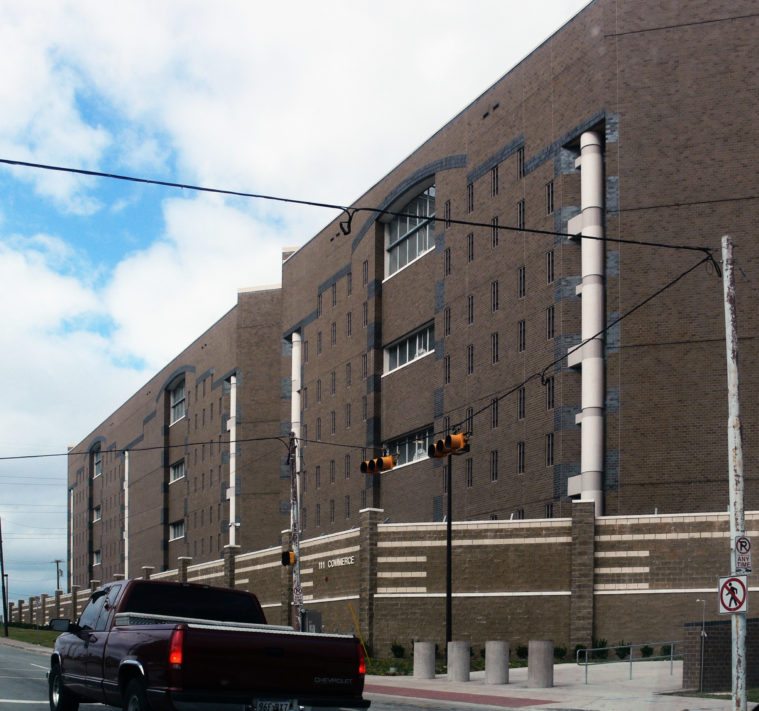To his Republican opposition, Dallas County District Attorney John Creuzot’s policies look “soft” on crime. Within a year of taking office in 2019, he stated his office wouldn’t prosecute certain crimes including shoplifting baby formula and, in many cases, first-time marijuana possession. Creuzot clearly signaled that decarceration was his goal, making him one of a small but visible contingent of reformist DAs to win over voters nationwide in the past decade. Creuzot is up for reelection this November, and the race will serve as a referendum on these progressive policies.
Creuzot is vying for another term in office against Faith Johnson, who held the position from January 2017 through 2018. Johnson was appointed by Governor Greg Abbott after her predecessor resigned from the position. Johnson, with her ties to Abbott, hefty campaign budget, and desire to return to more “tough on crime” policies, is a direct foil to Creuzot. While an upset of Creuzot is not expected, Johnson has secured an endorsement from Abbott himself, and she has significant money behind her, adding significant pressure for the incumbent to justify his policy stances and retain voter confidence.
As of late September, Johnson held a nearly threefold cash-on-hand advantage over Creuzot—about $530,000 to $180,000. Some major Republican donors, including Robert Rowling (who donated a whopping $260,000 to Johnson’s campaign) and Harlan Crow, are throwing their financial weight behind her. Creuzot, on the other hand, is getting a fair amount of in-kind support from Democratic PACs, including the Soros-funded Texas Justice and Public Safety PAC.
Johnson is using her massive budget and campaign platform to lambast Creuzot’s progressive policies. She told a North Texas TV station in October that, if she’s elected, Creuzot’s policy of not prosecuting theft of necessities—food, diapers, baby formula—worth less than $750 is “going out the window come January 1, 2023.” Johnson has also falsely cited a 200 percent increase in violent crime countywide during Creuzot’s tenure, which the Dallas Morning News has since debunked.

The policies in Johnson’s crosshairs are actually widely celebrated by experts who work in criminal justice. Mona Sahaf, a deputy director with the nonprofit Vera Institute of Justice, said the office’s current policies are in line with evidence-based best practices. “The great majority of arrests are for low-level offenses, and that is a sound place for a person to start when they’re thinking about how to increase capacity for all the system actors to … focus on violent crime.”
The idea of diversion—alternatives to jail for vulnerable people and those accused of minor crimes—is central for Creuzot, in part because Dallas jails are dangerously overcrowded. His office estimates that up to 70 percent of the jail’s population has a history of mental illness, and another sizable portion of people in jail are homeless, many locked up on misdemeanor trespassing charges. As elsewhere in America, the dragnet of mass incarceration catches those most vulnerable and forces them into the churn of the criminal justice system.
“Involvement in the system can increase your chances of future involvement in the system,” Sahaf said. “If you’re in court, if you’re on probation, if you go to jail, if you have fines and fees to pay—those types of experiences really impact your life. They can cause you to lose jobs and housing. They can cause you to be ineligible for certain jobs you might want. You might lose childcare.”
Creuzot’s policy of not prosecuting most first-time marijuana possession was put in place explicitly to address the racial disparity in drug prosecutions in the county. While most studies show little difference in the rates at which people of different races use marijuana, Black people are much more likely to be prosecuted for possession. “Arrests for those types of low-level offenses, especially marijuana, can introduce someone into the criminal justice system in more ways than we anticipate,” Creuzot told the Texas Observer. “When we have systemic racism to the extent that we have had and have through the United States, that’s just another facet of it. I was not going to be complicit in that.”
Miriam Krinsky, executive director of Fair and Just Prosecution, said Creuzot has made good on his promises to be a reform-minded prosecutor. She said Dallas is facing simultaneous crises of violent crime, mental health, substance abuse, homelessness—all things that plague large cities across the country. Because of this, the North Texas county stands to benefit significantly from diversion efforts on the part of the prosecutor’s office. Rather than usher vulnerable populations into the carceral system, Dallas can put resources toward support systems and crime prevention instead—all of which experts agree leads to more public safety.
“When we have systemic racism to the extent that we have through the United States, … I was not going to be complicit in that.”
Creuzot is part of a wave of district attorneys with reform-oriented platforms who have been elected in cities across the country. Although relatively few compared to the total number of DAs, Krinsky estimates these progressive prosecutors represent about 20 percent of the population, largely because these DAs tend to have jurisdiction over large urban areas. But it’s not an isolated phenomenon. “I really think that this movement for change, and communities demanding a different starting point, isn’t one that is limited to just the coasts or just large urban areas or even just what some would label bluer states or bluer bubbles within red states. It’s sweeping the country,” Krinsky said.
Jennifer Laurin, professor at the University of Texas at Austin School of Law, said the increase in reform-minded DAs taking office is in part the result of a very real culture shift in the United States. As the social and fiscal harms of mass incarceration were brought to light, people on both sides of the political aisle became interested in reducing jail and prison populations. In 2007, then-Governor Rick Perry supported a bipartisan effort to reduce incarceration rates by funneling money into diversion programs. The effort led to a significant drop in prison populations and the eventual shuttering of multiple facilities—though criminal justice reform has largely stalled at the Texas Capitol in more recent years.
At the same time, Laurin said, backlash against these prosecutors is to be expected. Many took over from long-standing DAs who had faced few competitive races during their tenures. The shift in norms, she said, is bound to ruffle some feathers. “You see threats here in Texas, broadly speaking, to respond at the legislative level to maverick district attorneys asserting various priorities or non-priorities in prosecution in their individual districts,” Laurin said. “That’s a really interesting feature of what’s going on right now.”
David Villalobos, campaign coordinator with the Texas Organizing Project’s Right2Justice efforts, said his organization is encouraging people to vote to keep Creuzot—and his decarceration-oriented policies—in place in Dallas. He said if Creuzot were to lose his seat to Johnson, it would be “damaging, especially to communities of color across Dallas County. Johnson was appointed by Greg Abbott. … If she returns to office, she’ll be a rubber stamp for right-wing policies that unjustly target working-class Black and Latino communities.”


